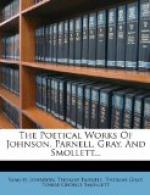* * * * *
JOHNSON’S POEMS.
LONDON:
A POEM IN IMITATION OF THE THIRD SATIRE OF JUVENAL, 1738.
“—Quis
ineptae
Tam patiens urbis, tam ferreus ut teneat
se?”
—JUVENAL.
Though grief and fondness in my breast rebel
When injured Thales[1] bids the town farewell,
Yet still my calmer thoughts his choice commend;
I praise the hermit, but regret the friend;
Resolved, at length, from vice and London far,
To breathe in distant fields a purer air,
And, fix’d on Cambria’s solitary shore,
Give to St David one true Briton more.
For who would leave, unbribed, Hibernia’s
land,
Or change the rocks of Scotland for the
Strand? 10
There none are swept by sudden fate away,
But all whom hunger spares, with age decay:
Here malice, rapine, accident, conspire,
And now a rabble rages, now a fire;
Their ambush here relentless ruffians
lay,
And here the fell attorney prowls for
prey;
Here falling houses thunder on your head,
And here a female atheist talks you dead.
While Thales waits the wherry that
contains
Of dissipated wealth the small remains,
20
On Thames’s bank in silent thought
we stood,
Where Greenwich smiles upon the silver
flood;
Struck with the seat that gave Eliza[2]
birth,
We kneel and kiss the consecrated earth;
In pleasing dreams the blissful age renew,
And call Britannia’s glories back
to view;
Behold her cross triumphant on the main,
The guard of commerce, and the dread of
Spain;
Ere masquerades debauch’d, excise
oppress’d,
Or English honour grew a standing jest.
30




